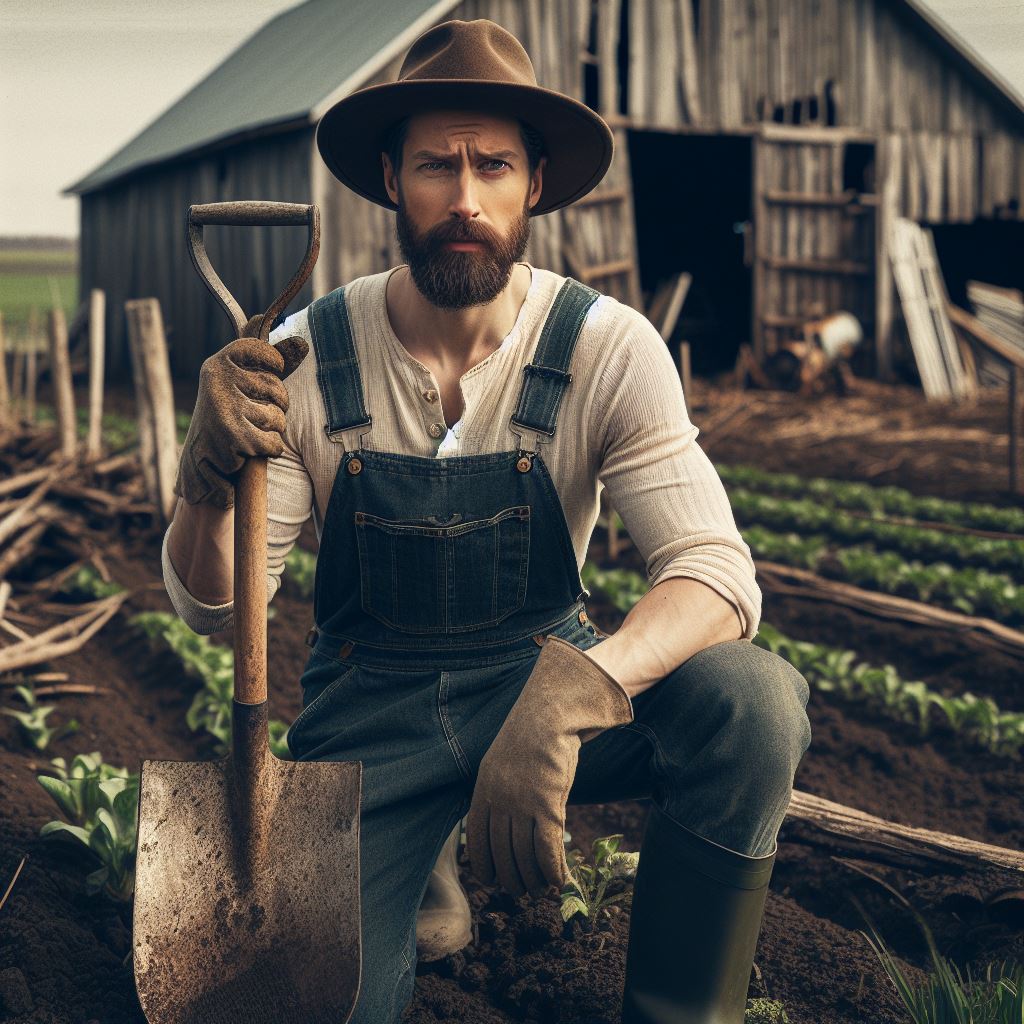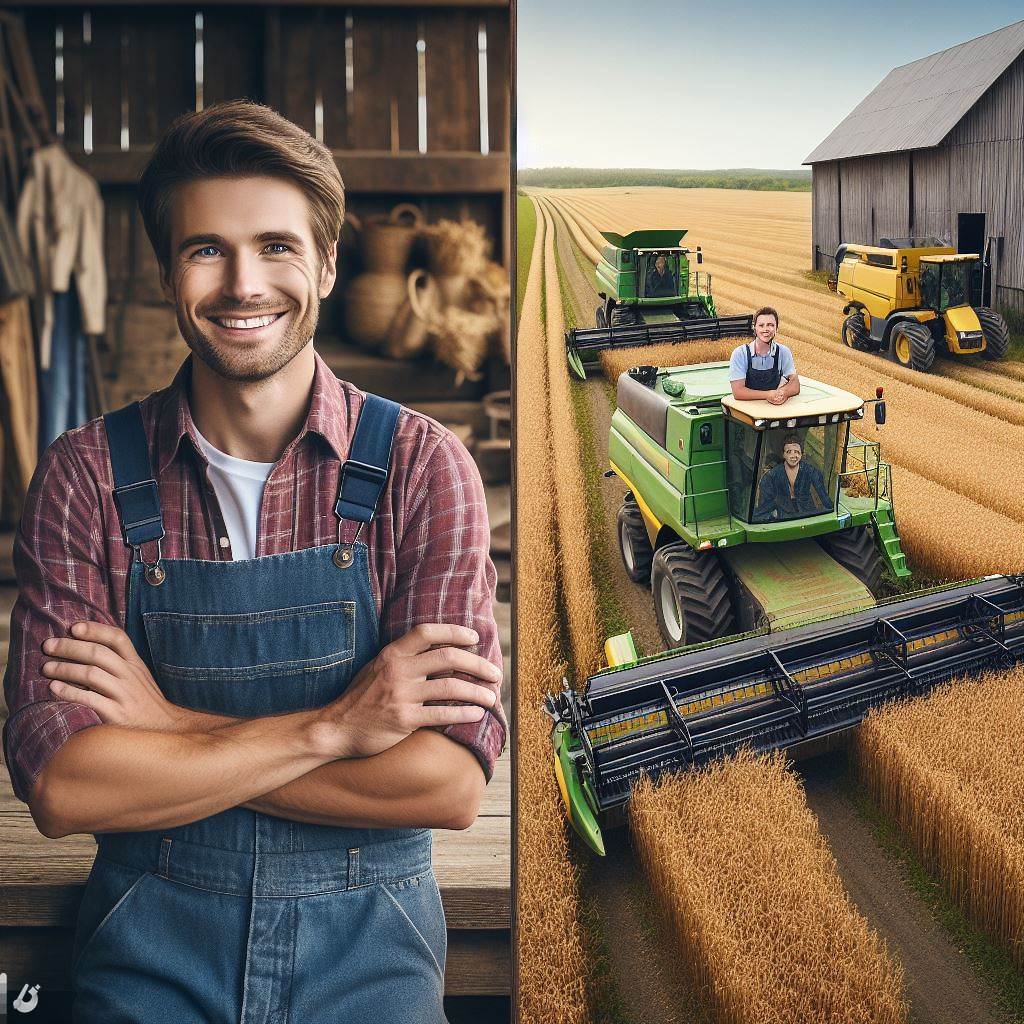Introduction
Brief overview of the importance of agriculture in Canada
Modern farming technology has revolutionized agriculture in Canada, enhancing efficiency, productivity, and sustainability.
Agriculture plays a vital role in Canada’s economy, contributing billions of dollars and employing hundreds of thousands of people.
With the help of advanced farming technology, Canadian farmers can produce higher yields and reduce environmental impact, ensuring long-term food security for the country.
Transition into the importance of modern farming technology
In recent years, the adoption of modern farming techniques, such as precision agriculture and digital farming, has gained momentum in Canada.
These technologies involve the use of data, sensors, and remote monitoring to optimize crop production.
Farmers can employ GPS-guided machinery, drones, and satellite imagery to accurately assess soil health, plant needs, and pest and disease outbreaks.
This information allows farmers to apply fertilizers, pesticides, and water precisely where needed, minimizing waste and maximizing crop quality and quantity.
Moreover, modern farming technology enables farmers to practice sustainable agriculture.
By utilizing conservation practices, such as crop rotation, cover cropping, and integrated pest management, farmers can enhance soil health, reduce erosion, conserve water, and boost biodiversity.
This technology also facilitates efficient use of resources, such as energy and water, reducing their environmental footprint.
Additionally, farmers can employ greenhouse technologies, vertical farming, and hydroponics to extend growing seasons and produce fresh, local food year-round.
Therefore, modern farming technology has become an indispensable tool for Canadian farmers.
It enhances productivity, sustainability, and competitiveness in the agricultural sector.
By embracing these advancements, Canadian farmers can ensure a reliable and secure food supply for the nation while minimizing environmental impact.
Continued investment in research, development, and adoption of farming technology is crucial to the future success of Canada’s agriculture industry.
Overview of Modern Farming Tech in Canada
Definition and Explanation of Modern Farming Technology
In recent years, the agriculture sector in Canada has seen a significant transformation with the adoption of modern farming technology.
This refers to the use of advanced equipment, machinery, and innovative practices to optimize agricultural production.
Modern farming tech includes various tools, such as drones, GPS systems, and sensors, which help farmers monitor crops, livestock, and environmental conditions more effectively.
It enables them to collect real-time data, analyze it, and make informed decisions to enhance productivity and sustainability.
Moreover, precision agriculture is another aspect of modern farming technology.
It involves site-specific crop management, where farmers use data-driven techniques to customize inputs, such as water, fertilizers, and pesticides, based on the specific needs of each plot or field.
This targeted approach minimizes waste and improves resource utilization.
Importance of Adopting Modern Farming Tech in the Agriculture Sector
The adoption of modern farming technology holds immense importance for the agriculture sector in Canada.
It offers numerous benefits that help farmers overcome challenges and maximize their yields.
One of the primary advantages is increased efficiency.
Unlock Your Career Potential
Visualize a clear path to success with our tailored Career Consulting service. Personalized insights in just 1-3 days.
Get StartedModern farming tech streamlines various processes, reducing manual labor and saving time.
With automation and data-driven practices, farmers can accomplish tasks more efficiently, allowing them to focus on other critical aspects of farm management.
Additionally, modern farming tech enhances productivity.
By utilizing drones and sensors, farmers can monitor crop health, detect diseases or pests early, and take precise actions.
This proactive approach minimizes losses and maximizes yields, contributing to overall agricultural productivity in the country.
Moreover, modern farming technology promotes sustainability.
With the help of precision agriculture, farmers can optimize resource utilization and minimize the environmental impact of farming practices.
By customizing inputs and reducing the use of fertilizers and pesticides, they contribute to preserving soil health, water quality, and biodiversity.
Statistics Showcasing the Rise of Modern Farming Tech Usage in Canada
The adoption of modern farming technology in Canada has witnessed a remarkable growth in recent years, as indicated by various statistics:
- In 2019, the adoption rate of precision agriculture techniques, such as variable rate technology and GPS guidance, reached 65% among Canadian farmers.
- The use of drones in agriculture increased by 68% from 2016 to 2019, enabling farmers to monitor crops, assess field conditions, and make informed decisions remotely.
- According to a survey conducted by Farm Credit Canada, 83% of Canadian farmers believe that adopting modern farming technology is essential for remaining competitive in the industry.
- In terms of digital connectivity, approximately 84% of farms in Canada have access to high-speed internet, enabling farmers to utilize modern tech tools effectively.
These statistics illustrate the growing acceptance and recognition of modern farming technology among Canadian farmers.
It showcases their willingness to embrace technology for sustainable and efficient agricultural practices.
Most importantly, modern farming technology plays a significant role in transforming the agriculture sector in Canada.
Its adoption not only enhances efficiency and productivity but also contributes to sustainability.
The increasing usage of advanced tools and techniques by Canadian farmers reflects their understanding of the benefits modern farming tech offers.
As technology continues to evolve, it is essential for the agriculture sector to stay updated and embrace innovation for a prosperous and sustainable future.
Read: A Day in the Life of a Canadian Farmer

Applications of Modern Farming Tech in Canada
Modern technology has revolutionized the agricultural industry worldwide, and Canada is no exception.
The adoption of modern farming tech has led to significant advancements in precision farming, automated systems, and data management.
These applications have brought numerous benefits to Canadian agriculture, improving efficiency, reducing costs, and ultimately boosting crop yield.
Precision farming and its benefits
Precision farming, also known as site-specific farming or satellite farming, is a precise approach to managing agricultural resources.
It involves the use of GPS technology and various sensors to collect data about soil conditions, crop growth, and weather patterns.
This information is then analyzed and used to make better decisions regarding irrigation, fertilizer application, and pest control.
By utilizing precision farming techniques, Canadian farmers can optimize resource utilization, reduce waste, and increase productivity.
The use of GPS and sensors in precision agriculture has transformed the way farmers interact with their fields.
With accurate real-time data, farmers can make informed decisions about when and where to apply certain inputs, such as water and fertilizers.
This targeted approach not only saves resources but also reduces the environmental impact of farming practices.
Additionally, precision farming allows for early detection of plant diseases and pests, enabling timely intervention and preventing crop losses.
Automated farming systems
Automated farming systems, another application of modern farming tech in Canada, have gained popularity in recent years.
Robotic technology is now increasingly used in performing various agricultural tasks.
Robots equipped with artificial intelligence can efficiently perform activities such as planting, harvesting, and weeding.
This automation reduces the need for manual labor and allows farmers to allocate their workforce to more complex and strategic operations.
The advantages of automation in Canadian agriculture are twofold: reduced labor costs and increased accuracy.
Manual labor is often expensive and hard to source, especially in remote farming areas.
By adopting automated systems, farmers can save on labor expenses and allocate resources to other areas of their operations.
Moreover, robots are highly precise and consistent, minimizing the risk of human error and improving overall productivity.
This increased accuracy leads to higher-quality crops and better financial returns for farmers.
Data management and analysis in farming
Data management and analysis have also become crucial in modern farming practices.
Canadian farmers now have access to vast amounts of data collected from various sources, such as sensors, drones, and satellite imagery.
Big data analytics and artificial intelligence are used to process and analyze this information, providing valuable insights for optimized farming practices.
By analyzing historical data and real-time inputs, farmers can make data-driven decisions regarding crop selection, planting schedules, and resource allocation.
Predictive analytics play a significant role in improving decision-making in agriculture.
By utilizing historical data and machine learning algorithms, farmers can predict crop yield, pest infestations, and market demands.
This enables them to proactively adjust their farming practices, mitigate risks, and optimize their overall agricultural output.
Predictive analytics also contribute to sustainable farming by minimizing the use of chemical inputs and reducing environmental impact.
In essence, the applications of modern farming tech in Canada have brought significant advancements to the agricultural industry.
Precision farming, automated systems, and data management techniques have improved resource utilization, reduced labor costs, and increased accuracy in farming operations.
These technologies have revolutionized the way Canadian farmers interact with their fields, allowing them to make data-driven decisions and optimize their crop yield.
As technology continues to evolve, Canadian agriculture will undoubtedly benefit further from these innovations.
Read: Sustainable Practices in Canadian Fishing
Examples of Modern Farming Tech in Canada
Modern farming technology has revolutionized Canada’s agricultural industry in numerous ways, making farming practices more efficient and sustainable.
This blog section will highlight some examples of modern farming tech in Canada and their benefits.
Vertical Farming and Hydroponics
Firstly, vertical farming and hydroponics are gaining popularity in Canada.
These innovative methods allow farmers to grow plants without the use of soil, instead utilizing nutrient-rich water solutions.
Vertical farming and hydroponics systems are especially advantageous in urban areas with limited space.
They make it possible to grow crops indoors, maximizing land use and reducing the need for transportation.
Drones and Remote Sensing in Agriculture
Drones and remote sensing play a crucial role in modern agriculture.
Farmers can now use drones equipped with advanced cameras and sensors to monitor crop health and detect pest infestations.
This technology enables farmers to take immediate action, preventing the spread of diseases and minimizing crop loss.
Additionally, remote sensing technology provides farmers with high-resolution data about their fields, allowing for better decision-making regarding irrigation, fertilization, and crop rotation.
Robotics and Automation in Livestock Management
In livestock management, robotics and automation have transformed the industry.
Robotics are now widely used in dairy farming, where they perform tasks, such as milking and monitoring the health of the herd.
These automated systems improve efficiency and accuracy while reducing labor requirements.
Automated feeding and milking systems have also been introduced, leading to increased productivity and animal well-being.
The integration of modern farming tech in Canada’s agriculture sector has several benefits.
Firstly, it enhances productivity by optimizing resource utilization and improving crop yields.
Farmers can grow more crops in smaller spaces, leading to increased food production.
Additionally, modern farming techniques reduce the dependence on pesticides and fertilizers, minimizing environmental impact and promoting sustainability.
Moreover, these technologies contribute to the economic growth of rural communities.
By adopting innovative farming methods, farmers can diversify their produce and meet the demands of new markets.
This expansion leads to job creation and stimulates local economies.
Furthermore, the use of modern farming tech reduces production costs, making farming more financially viable for small-scale farmers.
In fact, Canada’s agriculture industry has embraced modern farming technology to enhance productivity and sustainability.
Vertical farming and hydroponics offer a solution for urban areas with limited space, while drones and remote sensing revolutionize crop monitoring and management.
Robotics and automation assist in livestock management, making tasks more efficient and accurate.
The integration of these technologies positively impacts productivity, environmental sustainability, and the economic growth of rural communities.
Read: The Role of Technology in Modern Forestry
Benefits and Challenges of Modern Farming Tech
Modern farming technology offers numerous benefits to Canadian farmers, enabling them to enhance productivity and adopt environmentally friendly practices.
However, the adoption of modern farming tech also presents challenges that farmers need to overcome.
Advantages for Canadian farmers
Increased productivity and yields
Modern farming technology has revolutionized the agricultural sector in Canada by helping farmers achieve higher productivity and yields.
Through the use of precision agriculture, farmers can optimize planting patterns, monitor soil conditions, and apply fertilizers and pesticides more accurately.
These practices ultimately result in improved crop quality and increased profitability for farmers.
Environmentally friendly practices
The adoption of modern farming tech promotes sustainability and environmental stewardship.
Precision agriculture tools allow farmers to minimize the use of water, fertilizers, and pesticides.
By precisely targeting the application of resources based on real-time data, farmers can reduce their ecological footprint and protect the surrounding ecosystems.
This approach not only benefits the environment but also leads to cost savings for farmers in the long run.
Challenges of adopting modern farming tech
Initial investment costs
One of the significant challenges faced by Canadian farmers when implementing modern farming technology is the high upfront investment costs.
Purchasing advanced equipment, sensors, and software can be financially burdensome, particularly for small-scale farmers.
Additionally, infrastructure upgrades may be necessary to support the integration of new technologies, adding to the initial expenses.
Training and skill requirements for farmers
Another hurdle in adopting modern farming tech is the need for farmers to acquire new skills and knowledge.
Operating and maintaining sophisticated machinery and software demands a certain level of technical expertise.
Farmers must invest time and resources in acquiring the necessary training to leverage these technologies effectively.
Furthermore, older farmers may face additional challenges in adapting to emerging digital tools due to limited technological literacy.
Despite these challenges, the benefits of modern farming tech far outweigh the initial difficulties.
Canadian farmers who embrace technological advancements are poised to reap numerous rewards.
The increased productivity and improved yields lead to higher profitability and competitiveness in the market.
Moreover, adopting environmentally friendly practices aligns with consumer preferences for sustainable and ethically produced food, enhancing the marketability of farm products.
In short, the advantages of modern farming technology for Canadian farmers are evident.
The opportunities for increased productivity and environmentally friendly practices offer a promising future for the agricultural sector.
However, challenges such as high upfront costs and the need for training and skill development need to be addressed through government support and educational programs.
By equipping farmers with the necessary resources and knowledge, Canada can accelerate the adoption of modern farming tech and maintain its position as a leader in sustainable agriculture.
Read: Canadian Forestry Laws and Regulations
Conclusion
Recap of the importance of modern farming tech in Canada’s agriculture
Modern farming technology plays a crucial role in enhancing efficiency and productivity in Canada’s agriculture sector.
It allows farmers to streamline their operations, improve crop yield, and reduce waste.
Encouragement for farmers to embrace modern farming tech for a sustainable future
As the world’s population continues to grow, the demand for food will increase.
To meet this demand sustainably, farmers in Canada must embrace modern farming technology.
By doing so, they can improve their farming practices, conserve resources, and ensure food security for future generations.
Modern farming technology holds immense potential for Canada’s agriculture sector.
Its adoption can bring about significant benefits, not only in terms of increased productivity but also in terms of environmental conservation and long-term sustainability.
It is crucial for farmers to embrace and utilize these technologies to maximize their potential and contribute to a thriving agricultural industry.
By doing so, they can play a pivotal role in meeting the global food demand while safeguarding the environment for future generations.




